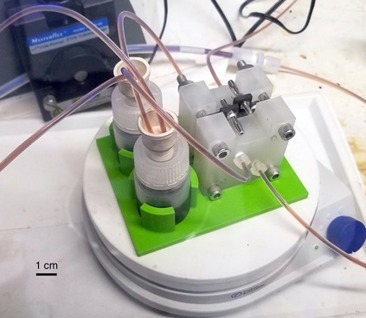Research on Redox Flow Batteries in the Monroe Research Group, Department of Engineering Science, University of Oxford
Redox Flow Batteries
Redox flow batteries (RFBs) store energy in liquid electrolytes rather than traditional solid electrodes and can offer competitive levelised costs of storage when implemented as stationary grid-scale energy storage systems. Symmetric flow batteries utilise a single electrolyte formulation instead of the usual two and offer simplified manufacture and operation, use of affordable non-ion-selective membranes, and more robust long-term performance. Furthermore, using nonaqueous solvents in lieu of water allows exploration of redox species that support cell potentials beyond the electrochemical window of aqueous electrolytes.
Successfully implementing symmetric electrolytes requires a new understanding of transport phenomena in the membrane due to shifts in relative contribution of different driving forces for crossover and self-discharge vs. traditional RFBs. Additionally, the choice of solvents and supporting salts in nonaqueous electrochemical systems strongly affects the solubility, stability, and electrochemical reversibility of redox-active molecules, resulting in a vast design landscape that prohibits optimisation through iteration.
The group currently seeks to further the understanding and state-of-the-art of symmetric and nonaqueous RFBs through refined electrolyte formulation and informed system operation. These aims are achieved by combining knowledge of electrochemical systems with bulk electrolyte property measurements, electrochemical characterization techniques, and model-based measurement and control of transport phenomena in benchtop-scale RFBs.

